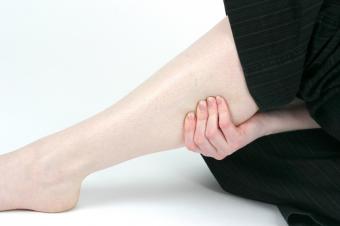Deficiency-Related Muscle Cramps

Vitamin B

Vitamin E

Vitamin C

Calcium

Magnesium

Vitamin D

Dehydration-Related Deficiency

Electrolytes

Avoiding Muscle Cramps

© 2025 LoveToKnow Media. All rights reserved.
As a college instructor and communication expert with extensive nonfiction and educational writing experience, Mary shares tips and advice related to a wide variety of topics.
Read MoreLearn about our Editorial Policy.

If you're experiencing regular or persistent muscle cramps, then you may have a vitamin or mineral deficiency. That's because certain vitamins, minerals and nutrients are needed for proper circulation and muscle contraction.
Leg cramps are the most common muscle cramps that arise as a result of nutritional deficiencies, though cramps may occur in other areas. Fortunately, identifying and correcting deficiencies can make associated cramping problems disappear in short order.

One common culprit is a deficiency of B vitamins, particularly biotin (B7) and thiamine (B1). That's because both these B-complex vitamins promote blood circulation. In the case of deficiencies of the B vitamins, blood may not flow as efficiently and cramping, particularly of the legs, may result.

Vitamin E, found in almonds and other foods, acts as an anti-oxidant that removes free radical damage from the body. When free radicals build up in the bloodstream, they can irritate vessels and lead to muscle cramping.

Vitamin C aids in the absorption of essential electrolytes and minerals like calcium, magnesium and potassium. Deficiencies in vitamin C can lead to electrolyte deficiencies, which in turn can cause cramping.

Muscle cramps can be a symptom of a calcium deficiency. Calcium is an important mineral that is needed for bone and blood health. Increasing calcium consumption and/or taking supplements may be the answer to your cramping problems.

Along with calcium, magnesium is the other major mineral deficiency associated with muscle cramps. Magnesium, which is readily found in fruits like figs, is primarily responsible for activating countless enzymes in the human body. Magnesium is required to maintain the electrical charges in cells, particularly in muscle cells. When there is a deficiency of this mineral, cramping in the muscles and problems related to muscle contraction can occur.

Vitamin D works in conjunction with calcium and magnesium to control muscle contraction. An imbalance between these three nutrients can lead to muscle spasm. To increase vitamin D, spend a few minutes each day in the sunshine, consume adequate amounts of fortified dairy or soy products, or take a good quality supplement.

Dehydration can cause an imbalance of the minerals sodium, potassium, and chloride which can result in muscle cramps as well. It is essential that you drink plenty of water each day. This equates to at least half of your body weight in ounces of water. For example, if you weigh 150 pounds, you need to drink at least 75 ounces of water every day to avoid dehydration.

Electrolytes are also essential nutrients impacting associated with cramps. Electrolyte imbalances occur in the case of nutritional deficiencies or when you sweat a great deal and lose essential electrolytes through your sweat glands. Sports drinks like Gatorade are a good option for replacing lost electrolytes.

The best way to avoid muscle cramps and vitamin deficiency is to eat a healthy diet filled with a variety of natural foods packed with the nutrients your body needs. You can also replenish fluids and electrolytes as they are lost, supplement with a daily multivitamin and get plenty of exercise and sunshine. When you undertake this type of healthy lifestyle, muscle cramps from nutritional deficiencies will become a thing of the past.